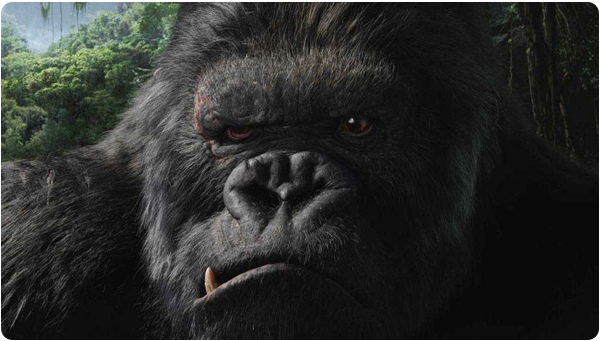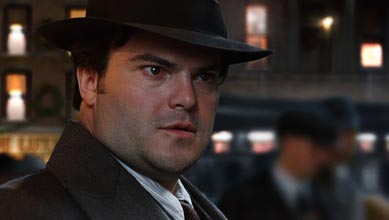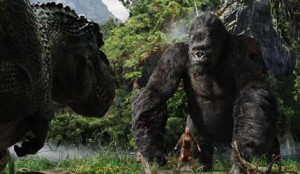 I have issues with King Kong. A lot of issues.
I have issues with King Kong. A lot of issues.
Forget for a moment that the original Kong was a blatantly racist polemic masquerading as a pulp fantasy-adventure yarn. Forget that no one is willing to even countenance this contention, much less discuss it in a calm, rational manner (perhaps during a double feature: Kong and 1915’s Birth of a Nation). Forget that no one, anywhere, appears willing to question this movie’s informed superiority. Why criticize when you can parrot over seventy years of generalized praise? Hell, its a classic, right? Must be: it came out before 1970.
“The classic film will always be the classic film,” said director Peter Jackson in a recent magazine interview (citation lost thanks to sleep deprivation). He might’ve added, “After all, it’s a classic!” just to drive the stake right through the heart of his point. The slavish worship Kong inspires in its fans honestly sickens me sometimes. (I’m sure this is how Star Wars and Trek partisans feel about each other.) Because what is Kong, really? Its story, constructed of reliable pulp staples, is hardly revolutionary. Hell, it’s the kind of tale chain smoking writers of the age turned out in their sleep…or their alcohol induced comas. The down-on-her-luck damsel gets a one-in-a-life-time chance to go to an uncharted island and become a monkey’s plaything…or a dinosaur’s bite-sized snack. The damsel, once distressed, needs the quick thinking of a square jawed man to save her bloomer-wearing ass. He does, the movie ends.
Except, it doesn’t. And even I, full of venom and vitriol, must appreciate Kong‘s creators for their decision to drop the big ape into New York’s concrete jungle. Kong’s third act rampage through the Apple and his pointless, impersonal death at the top of the world became iconic for good reason. The power of those images has already inspired one remake…but no one liked it. Even I’ve grown annoyed with some of its more…dated elements. Rick Baker’s still the man, but Jesus, Bridges, you look like a bigger monkey than that suit does…
“The seventies remake was more dated than the original,” Jackson’s stated. “We didn’t want to do that.” No, Pete, you wanted to do ’em one better. Like, two and a half hours better, raising the level of character development throughout the piece from “non-existent” to mildly detestable, almost annoying. As Nathan said on his blog, “The new version makes the original look like a sketch for the full production.” Great minds run in small circles, Shumate. Jackson’s choice to remake the movie as a period piece allows me to close my eyes and imagine these are the real world events upon which the original movie was based. A throw-away mention of Merian C. Cooper only enhances the illusion…as if these beautiful CGI shots of Prohibition Manhattan weren’t enough.
If nothing else they made it pretty. Oh, so pretty, New York City…
Rather than open with, “Is this the moving picture ship?” Jackson takes his time (and lots of it…this version is over three hours long), recreating 1933 in astonishing detail. Where he once was a flat, unblemished, straight-backed monument to movie producers, Carl Denham (Jack Black, quite a long way from Tenacious D) is here a shameless self-promoter, two parts cranny barker and one part raving maniac. He looks to finish (or even begin) his new picture at any cost, even if he has to steal, scheme and hustle all of the other characters into joining him on a long sea voyage. “I’ve come into possession of a map,” he tells unimpressed studio execs, “the sole surviving record of an uncharted island…never before seen by man…that’s where I’ll shoot my picture.”
 The execs, already sweating Denham’s inflated budget, decide to can the “jumped-up little turd” before he says anything crazier. Too bad Denham’s already gone, camera equipment in tow. All he needs is a pretty face to set in front of it.
The execs, already sweating Denham’s inflated budget, decide to can the “jumped-up little turd” before he says anything crazier. Too bad Denham’s already gone, camera equipment in tow. All he needs is a pretty face to set in front of it.
As before, he finds Ann Darrow (Naomi Watts), reimagined here as about as much of a human being as you’re likely to find in the movies. I’ll admit some pre-show jitters about Ann’s reinterpretation, but Jackson co-writes everything with his wife these days, so Watts has an emotionally complex character to work with. A vaudevillian actress, having seen her theater close, struggling to survive in the 1933 streets, Ann is once again saved from getting busted for stealing fruit by Denham’s timely interventions. Heck, Ann’s the first character we meet after the opening montage, which is only as it should be. She may not get the good lines (Denham’s job) but she is the emotional lynch pin of the piece. It’s good to see her portrayed as an actual human being with a life apart from sea voyages, square jawed men, and giant monsters for once.
That life ends, of course, when Denham buys her a meal and makes his pitch. In these pitches (made continuously throughout the film), Jack Black makes the role his own and puts my jitters about his casting to rest. Black’s Denham comes across as the consummate user, just the kind of wild-eyed, snake oil salesman who fetched up on the Left Coast of this movie’s time-setting. (Their inbred decedents rule the roost today. And you wonder why so many movies suck ass.) Denham’s creative flexibility with the truth also shoehorns the other major player in this drama: a socially inept playwrite from “the federal the-ater” named Jack Driscoll (Adrian Bordy).
Yes, Virginia, its 2005 (or 6, now) and look how far Hollywood has come? No unabashedly sexist hunks of man-meat in this movie, no sir. Here Our (human) Hero is a sensitive, artistic soul, who bonds with Ann over the course of their long sea voyage. Makes sense, really. She’s the only woman on the ship and Peter Jackson was cleaver enough to show her reading one of Driscoll’s plays at her introduction. She’s his biggest fan, and he’s a fucking writer (such a fucking writer, he even starts writing a play for her); their love was written in the stars and on Peter Jackson’s word processor of choice. Contrived? Certainly. But, then again, isn’t the entire film?
I’m not bitching just to bitch. Their love is necessary to the plot. If nothing else, it keeps me from pondering the beastiality subtext running through all of these “monkey-meets-cute-girl” movies. Plus it gives the movie its “human interest.” Every movie needs that right? Yet familiarly breeds contempt, and in this schizophrenic year of your Lord, 2006, I find myself with nothing but contempt for modern movie romance. How many times can you honestly reinvent the wheel? Especially if all your leading couples keep falling into the same kind of syrupy, sentimental love we’ve come to expect, despite how much, or how little, they have in common with each other. Despite being the character I identify with the most (being a writer and all), I must point out Jack’s flatness, his one-dimensionality. Obviously an authorial cipher, this Jack Driscoll exists to fulfill every genre nerd’s lifelong dream and rescue the girl from the savage island’s God King. The Writer as Action Hero. Not a role we’re usually called upon to play in this parallel dimension, not one we’re really equipped for. Brody has the chops to pull it off without generating an unrealistic Action Movie aura (though he is covered by the Heroes Battle Death Exemption)…until Kong’s final rampage through Manhattan, with its unnecessary Car Chase.
Worse still, Jackson chooses to show growing love through his new favorite directorial device: the lingering close up, backed by sentimental music. It’s the same kind of shameless emotional manipulation that weighed Return of the King down. I’ve dubbed it “Lord of the Rings Syndrome,” and hope to God Peter Jackson gets the help he needs, and soon.
At least he seems to be weening himself off slow motion. (Otherwise the movie would’ve been four hours long.) Thank my lucky stars. But Jackson squanders a good chunk of my good will later in the film by utilizes these same lingering close ups to illustrate the developing bond between Ann and Kong. I rather not think about bestiality while I’m watching a giant monster movie, Pete. Honestly, are they going to have a big kiss at the end? Thankfully, no. Though there is a flagrant ET Moment.
But before we get to all that, the crew of the Venture must blunder into Skull Island. This time, actual blundering strands the ship for a day, but that’s all the time Denham needs to take his merry band ashore, almost die, and show Ann off to the natives. They abduct her that night, and the reluctant Captain Englehorn (played with gusto by Thomas Kretschmann) drops anchor and, with Jack leading the charge and Carl filming every chance he gets, mounts a rescue.
Blundering about Skull Island takes up most of the pictures three hours, as it should. I must salute Weta Workshop here: they’ve designed the best looking fake-biosphere I’ve seen in a long time. Every inhabitant of the Island seems hostile to human life, and many a Venture redshirt gets himself e’t along the road. Jack and Denham, each deep in Single-Minded Quest Mode, fail to notice, but you can tell Jackson doesn’t. He even made an attempt at characterizing a few of the Venture‘s crew, so their meaningless deaths are at least supposed mean something to us, safe in our chairs.
The dinosaurs, giant bugs, and monstrous vampire bats (what? were pterodactyls on strike that week?) all come across as realist enough. Against the lush, matte painted forests of Skull Island they even seem to fit in. Once Kong gets to New York, Jackson employs the usual film-in-darkness techniques, but on the Island we see Kong fight his battles in full sunlight, and it is a glorious sight. Gives me hope, frankly. The next generation of giant monster movies may not be smart, but they’ll sure as hell be pretty.
We all know how this ends. King Kong is an unusually strong film. As I said, they made it pretty, but they also made it smart. Gone are the days of racist patronization and noble savagery. The natives here don’t bother with that , “give you six of ours for that blond” crap. “Give her to Kong,” the old village witch-woman says in a tone that requires no subtitles. Thanks to inspired production design and attention to detail we understand these people as the last scion of a dying civilization, driven in all they do by that incredibly old-time religion. The sacrificial sequence is well worth the price of admission alone…as is Kong himself.
 Apparently, Andy Serkis (Smeagol to you, internet punks) spent quite an amount of time hanging out with a gorilla named Zaire at the London Zoo. It shows in his performance, brought to photo realistic life by the good people at Weta. I’ll go out on a limb and label it the Best. Kong. Ever, if only because this time Kong’s interactions with Ann seem…for lack of a better word…natural. Improvements in CGI help, as does the fact Jackson and Co. allowed Ann to be “a girl from New York,” with all the intelligence and drive to repeatedly attempt escape. When that fails, Jackson and Co. one-up themselves by revealing Ann’s creative, imaginative, and brave enough to entrance Kong the only way she knows how: with a stage act. One can almost see the wheels turn in Kong’s digital head: “Damn, never had one that played back before.” For once, the filmmakers supply a tangible reason for Kong to fall in (“love”? Really? If so, ewww….) with something a tenth his size. This simple element (little more than a pay-off of Ann’s opening vaudeville routine) goes a long way towards shoring up my suspension of disbelief. Gorillas are smart. Kong would only care about something so minuscule if she managed to entertained him, to engage him as a being.
Apparently, Andy Serkis (Smeagol to you, internet punks) spent quite an amount of time hanging out with a gorilla named Zaire at the London Zoo. It shows in his performance, brought to photo realistic life by the good people at Weta. I’ll go out on a limb and label it the Best. Kong. Ever, if only because this time Kong’s interactions with Ann seem…for lack of a better word…natural. Improvements in CGI help, as does the fact Jackson and Co. allowed Ann to be “a girl from New York,” with all the intelligence and drive to repeatedly attempt escape. When that fails, Jackson and Co. one-up themselves by revealing Ann’s creative, imaginative, and brave enough to entrance Kong the only way she knows how: with a stage act. One can almost see the wheels turn in Kong’s digital head: “Damn, never had one that played back before.” For once, the filmmakers supply a tangible reason for Kong to fall in (“love”? Really? If so, ewww….) with something a tenth his size. This simple element (little more than a pay-off of Ann’s opening vaudeville routine) goes a long way towards shoring up my suspension of disbelief. Gorillas are smart. Kong would only care about something so minuscule if she managed to entertained him, to engage him as a being.
That he is a being is evident in ever frame. This is the closest Kong has come to being a fully-fleshed character, possibly the closest he can come on film. He’s easily the most engaging character, and Serkis’ performance deserves awards. His body language communicates more than these poor words can convey. You will believe a gorilla can rampage through Time Square. And Jackson does us all a good turn by remembering the real point of all this. As my girlfriend said
“The King of the world he knew, who up ‘til now had toiled and battled in utter obscurity, escapes the captivity imposed upon him by the modern world and literally pulls himself up to a point where everyone must look up to him. They have no other choice. He’s reached the Absolute Height…and at dawn, no less. Can’t get much more symbolic than that. The formerly obscure, the blackest of the black, this God of the fog jungles and ‘the last blank space on the map’ has surmounted the straight-line, ninety-degree-angled world of ‘civilization’ in the most ironically obvious of ways. The unknown, the ignored, makes himself impossible to ignore. So he has to die. We have kill him, the way we kill everything he represents.”
Indeed. We have no other choice. Because Jackson realized this from the beginning, he may not have made the best giant monster movie, but he’s certainly made the best critique of the original King Kong I’ve ever seen. Whereas that film celebrated the destructive urges of our civilization, this film unabashedly showcases them without lapsing into the melodrama that shot Dino De Laurentiis’ “reimagining” in both feet with a nail gun. Not only are we aware of the fact our civilization destroys every last wild and free thing it touches, we get to feel bad about it. Now, if only we could do that without the syrupy sentimentality of Hollywood injecting sour notes (like the ice skating scene – so obligatory to New York City romances even my girlfriend recognized the trope after living without TV for years). A lot of people complain about movies that tell them what to think. I’m much more annoyed when movies tell me what to feel, and Jackson is getting sentimental in his old age, seemingly bucking for Stephen Spielberg’s Middle Brow Crown. Watch it, Pete. You’re the man who gave us Meet the Feebles, remember? You’re rich as hell: there’s no need to play to the straights now.
But we giant monster fans must take what we can get. At this rate, it’ll be years before someone else with a genre conscious takes up the baton. In the mean time, thank you, Jackson. It’s easily your best film since The Frighteners. Now go make The Hobbit, before Ian Holm dies on us.
![]()
![]()
![]()
![]()

I do wish Jackson had left out the spider pit sequence. That’s really my biggest complaint. It would be a cool bit in any other Lost World movie where the point of the movie is just surviving the environment. In King Kong it stops the story dead. It’s a gross out sequence. We know Jack will make it. We expected that everyone else was already dead so showing them die horribly isn’t an improvement.
Absolutely. Worse, still: nearly everyone who dies in that whole is a one-dimensional, ancillary character (Lumpy the Cook, say) or an anonymous Venture crew member – the King Kong movie analog of Star Trek‘s Red Shirt. Their deaths are meaningless exercises in driving the body count towards triple digits…something a protracted Giant Ape rampage through New York (without the needless car chase) could’ve done just as well, while being more aesthetically pleasing to this desperate daikaiju fan.